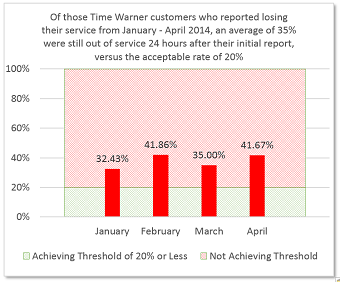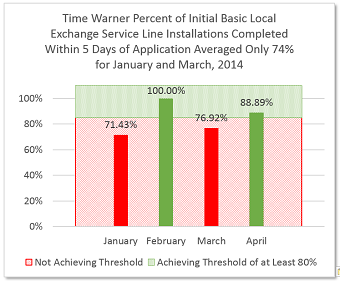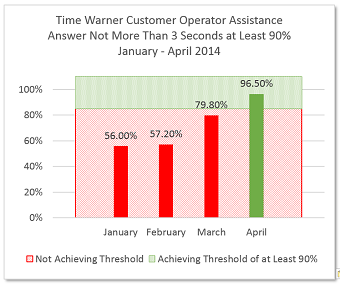Time Warner Service Quality: Falling Short
As we reported June 23rd, Time Warner service quality has been questioned in numerous public comments regarding the pending review by the PSC of its proposed acquisition by Comcast. Heavily redacted versions of the Company’s service quality reports to the PSC for January – April, 2014 (released under a Utility Project FOIL request only after a PSC ruling required Time Warner to do so) confirm the Company falling short in four-out-of-six measurements of service quality.
Two issues involve providing continuous service. Firstly, from January – April, of those customers who reported losing their service, an average of 35% were still out of service 24 hours after their initial report, versus the acceptable rate of 20%. In fact, the Company achieved nowhere near the threshold of less than 20%: in February and April the percent out of service after 24 hours was above 40%.
Secondly, of those customers who reported service trouble in February and April, an average of 25% were still experiencing trouble 48 hours after their initial report, versus the acceptable rate of 20%.
As for timely installations, in two-out-of-four months (January and March) Time Warner, which is now regulated by the PSC as a telephone service provider, fell short of the acceptable 80% standard of completing basic local exchange telephone service installations within 5 working days after application, averaging just 74% completed.
Worth noting is that – unlike the prompt service initiation requirements for electric and gas service providers – there are no customer remedies for late installation by telephone service providers. Electric and gas customers are entitled to recover $25 from the utility for each day that service initiation exceeds 5 days of their application (without cause). No such remedy exists for telephone customers.
Lastly, we note that from January – March the percent of calls answered by an operator in not-more-than 3 seconds fell woefully short of its performance standard of 90%, then miraculously soared to 96.5% in April – on the brink of filing for merger approval! (More: New York’s Utility Project on the Time Warner / Comcast merger)
At least they proved they could do it!
Will service quality improve if the proposed announced merger of Time Warner Cable with Comcast is approved? The Utility Project has concluded that there is no commitment to improve service quality put forth in the Joint Proposal to New York Public Service Commission by Comcast and Time Warner. Such a commitment might have been one of several benefits necessary to determine that the merger could result in significant net positive benefits achievable only through the transaction that outweigh the risks to universal service and consumer protection. Now that Time Warner has demonstrated valiantly its ability to meet service quality standards in three out of four problem areas, the question is: Do they need a merger to accomplish all four (consistently)?




